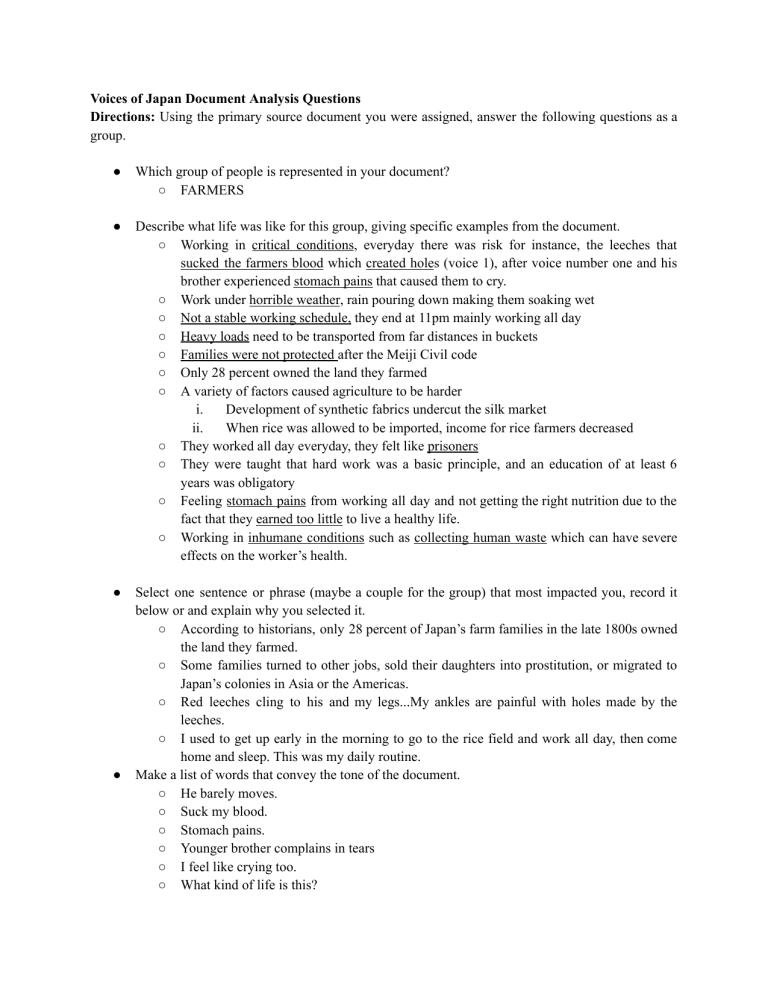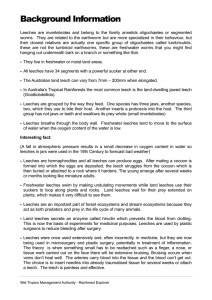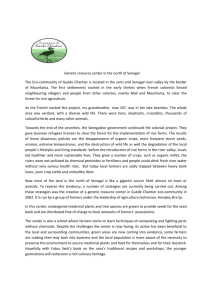
Voices of Japan Document Analysis Questions Directions: Using the primary source document you were assigned, answer the following questions as a group. ● Which group of people is represented in your document? ○ FARMERS ● Describe what life was like for this group, giving specific examples from the document. ○ Working in critical conditions, everyday there was risk for instance, the leeches that sucked the farmers blood which created holes (voice 1), after voice number one and his brother experienced stomach pains that caused them to cry. ○ Work under horrible weather, rain pouring down making them soaking wet ○ Not a stable working schedule, they end at 11pm mainly working all day ○ Heavy loads need to be transported from far distances in buckets ○ Families were not protected after the Meiji Civil code ○ Only 28 percent owned the land they farmed ○ A variety of factors caused agriculture to be harder i. Development of synthetic fabrics undercut the silk market ii. When rice was allowed to be imported, income for rice farmers decreased ○ They worked all day everyday, they felt like prisoners ○ They were taught that hard work was a basic principle, and an education of at least 6 years was obligatory ○ Feeling stomach pains from working all day and not getting the right nutrition due to the fact that they earned too little to live a healthy life. ○ Working in inhumane conditions such as collecting human waste which can have severe effects on the worker’s health. ● Select one sentence or phrase (maybe a couple for the group) that most impacted you, record it below or and explain why you selected it. ○ According to historians, only 28 percent of Japan’s farm families in the late 1800s owned the land they farmed. ○ Some families turned to other jobs, sold their daughters into prostitution, or migrated to Japan’s colonies in Asia or the Americas. ○ Red leeches cling to his and my legs...My ankles are painful with holes made by the leeches. ○ I used to get up early in the morning to go to the rice field and work all day, then come home and sleep. This was my daily routine. Make a list of words that convey the tone of the document. ○ He barely moves. ○ Suck my blood. ○ Stomach pains. ○ Younger brother complains in tears ○ I feel like crying too. ○ What kind of life is this? ● ○ ○ ○ ○ ○ ○ ○ ○ ○ ○ Human waste work all day, Beats our bodies Carloads Soaking wet Leeches Contradictions Prison Miserable Compulsory Directions: Discuss your responses to Part A, making sure everyone is involved in the discussion. In your next group, you will be the representative expert from this group, explaining what life was like for your group during Japan’s modernization process. Using the space below, write down key points from the readings that you will share with other students outside of your expert group. Make sure that everyone is in agreement, so that you are presenting a unified picture of your workers to the rest of the class. The group of Japanese workers you are representing is: Farmers ● Bulleted Notes: Costs ○ A lot of health risks ■ Carrying human waste = diseases ■ Blood sucking leeches ■ Bad weather ○ They knew their situation would not get better. (They felt they lived in a Prison). ○ Burnout because they would do the same thing all day, everyday. ○ Working in inhumane conditions. ○ The farming families were not protected by such brutal change. ○ Land was taken away from families who previously owned and farmed them. ○ The value of hugely demanded products were lowering significantly. ○ They had to prostitute their daughters to be able to make a living. ○ They were forced to migrate to other parts of the world because they could no longer take the amount and quality of work, which would eventually weaken the nation ○ They had no time to rest, working from morning to night, which meant their bodies could not recuperate and heal. Benefits: ○ Six years of compulsory education was provided by the government. ○ Strengthening and enriching the nation ○ Very disciplined individuals.





